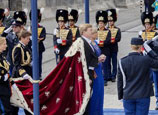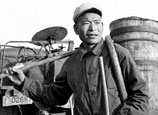
KATHMANDU, May 1 (Xinhua) -- Looking closely at speeches and utterances made by UCPN (Maoist) Chairman Pushpa Kamal Dahal Prachanda during his four-day official India visit, that concluded Tuesday, one can find a clear departure from the Maoist party's earlier policy towards Nepal's southern neighbor, analysts said here Wednesday.
During his meetings with Indian leaders including Prime Minister Manmohan Singh, Prachanda this time did not discuss the party's differences and disputes; he was more focused on winning the trust of Indian leaders.
During the ten-year insurgency and after entering the peaceful mainstream politics in 2006, the Maoist party had been demanding that unequal treaties signed with India should be scraped; India should stop encroaching Nepali land and it should stop interference in Nepal's internal affairs.
"Raising old differences will provoke the bilateral relation, so we have to redefine our relation with India," said Prachanda in an interview with the Kantipur, an influential Nepali language daily on April 30.
As the party chairman, Prachanda did not raise these contentious issues during the visit, giving a message to the Indian leadership that the party has changed its earlier policy towards India.
"UCPN (Maoist) abandoned their agendas to appease India because the party has realized that without making a cordial relationship with the southern neighbor it is difficult to get power in the country," said political analyst Mumaram Khanal, who is also a former UCPN (Maoist) leader.
In his earlier visit in 2008 as the prime minister of Nepal, Prachanda raised these issues and demand with the Indian leadership to address them. But this time, before flying to India, Prachanda said that he would not talk about party's differences with India.
During the meeting with Indian leaders, Prachanda tried to assure them that his party is ready to address the security and other concerns of India. The UCPN (Maoist) policy towards India became one of the contentious issues in the party after it joined the mainstream politics in 2006. The party's India policy was one of the major reasons for its break up in June 2012.
Now, Prachanda is seeking a cordial relationship with the southern neighbor. In his political document endorsed by the party 's seventh general convention last year, Prachanda talked about making cordial relation with India and balanced relationship with both neighboring countries, India and China.
Indian leaders lauded the line taken by UCPN (Maoist) from its general convention.
"Prachanda's approach is a realistic one because only talking about the differences and old things would not be helpful for economic prosperity in Nepal," said Lokraj Baral, former Nepalese ambassador to India.
After resigning from the post of the prime minister over a row over sacking the then Nepal Army chief Rookmangud Katawal in 2009, Prachanda launched a virulent anti-Indian campaign.
Relations between Nepali Maoist and India hit a low at that time. UCPN (Maoist) after the Katawal case was raising the issue of "national independence" but now it seems that the Maoist party has downplayed this issue. The CPN-Maoist, the breakaway faction led by Mohan Baidya, has been continuing its anti-India rhetoric.
Political observers say UCPN (Maoist) changed its India policy realizing that India has a huge influence in Nepal's internal politics and it is not possible to gain power without appeasing the country's southern neighbor.
















 Different walks of life in China : Labor Day
Different walks of life in China : Labor Day


![]()
